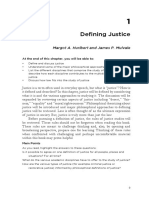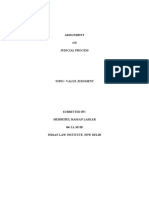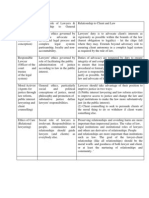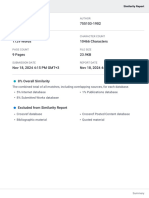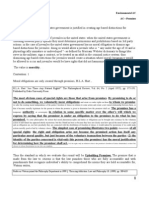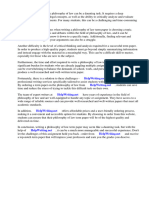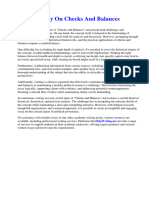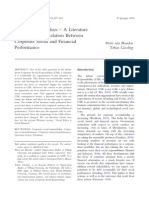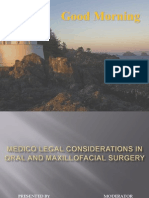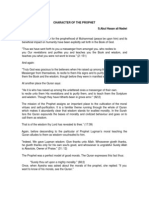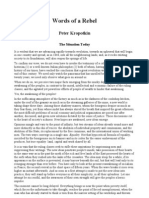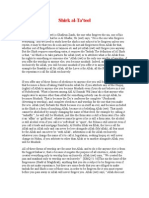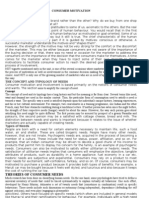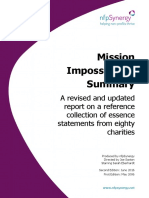Power of Integrity Paper
Power of Integrity Paper
Uploaded by
api-302501639Copyright:
Available Formats
Power of Integrity Paper
Power of Integrity Paper
Uploaded by
api-302501639Original Title
Copyright
Available Formats
Share this document
Did you find this document useful?
Is this content inappropriate?
Copyright:
Available Formats
Power of Integrity Paper
Power of Integrity Paper
Uploaded by
api-302501639Copyright:
Available Formats
Running head: THE POWER OF INTEGRITY
The Power of Integrity
Debbie L. Langley
Latter-day Saint Business College
POWER OF INTEGRITY
Recently, I read the book Choosing Ethical Excellence, written by Alan V. Funk. Funk is
a former Special Agent with the FBI, where he specialized in major white-collar crime
investigations. He is the former National Director of Fraud Investigative Services for one of the
largest CPA firms in the world. He continues to investigate and to serve as an expert in matters
relating to fraud, bankruptcy, accounting, and finance. In his book, he discusses:
what constitutes ethical behavior and explores [the] process involved in any persons
quest to consistently behave according to the highest of ethical standards. . . The
processes are identified as choices that move a person beyond mere compliance with the
ethical requirements. . . the law and. . . special rules. Choices for ethical excellence
involve a high level of competence and diligence, and an abiding regard for the truth.
(2006, book jacket)
Ethics sounded to me a lot like integrity to me, so I went to the Merriam-Webster
Dictionary to compare their definitions. Ethics is defined as: (1) a discipline dealing with good
and evil and with moral duty; (2) moral principles and practice. The definition for integrity is:
(1) adherence to a code of values: incorruptibility; (2) soundness; (3) completeness (Mish, 2004).
After studying the definitions, I have come to the conclusion before there can be ethics there
must be integrity. Integrity is the foundation of moral principles, which can depend on culture,
location, and family up-bringing.
There seems to be more focus in our news on unethical behaviors from around the world,
and particularly in our nations business, sports, and even our nations legal system starting with
the police all the way up to the Supreme Court. Such a broad array of information is difficult to
analyze. However, there is one segment of our legal system that lends itself well to analysis and
that is lawyers. When lawyers are caught in unethical behaviors, they are, for the most part,
POWER OF INTEGRITY
silently dealt with away from the public eye, so most do not have to face disgrace from anyone
except their peers. I believe there is a correlation between the development of personal integrity
while growing up and the ethical behavior of a lawyer.
Lawrence S. Krieger, full-time faculty member at Florida State Universitys College of
Law, argues (1) that satisfaction and professional behavior are inseparable and manifestations of
a well-integrated and well-motivated person; and (2) that depression and unprofessional behavior
among law students and lawyers typically proceed from a loss of integrity a disconnection
from intrinsic values and motivations, personal and cultural beliefs, conscience, or other defining
parts of their personality and humanity. He suggests a better way to teach professionalism to
law students and lawyers is to make it more relevant by showing that life experiences are
enhanced on many levels by acknowledging their cultural values and integrity to model the
wise, compassionate lawyer-statesperson (2005, p. 426).
When teaching, Krieger does something few other professors have the courage to do. He
starts out by telling his students the truth about the dismal results from surveys on attorneys
mental health and career satisfaction. Krieger tells them about the outrageously low standards of
behavior often encountered among attorneys and judges out in the real world they are preparing
to enter (2006, p. 426). With permission, Krieger, uses the journals of student peers enrolled in
clinical litigation programs and his own experiences in litigation. He tells them about the
manipulative, abusive, egotistical, and often plainly dishonest actions of members of our
profession. The students are shocked when they see data summaries showing lawyers to have
the highest incidence of depression of any occupation in the United States. A lawyer is 15 times
more likely to suffer some form of emotional distress than the general population (Krieger, 2006,
p. 427).
POWER OF INTEGRITY
This eye-opening experience lays the ground work for future discussions in Kriegers
classes for the positive side of the topic which focuses on values and motivating factors for most
people. He recognizes that certain common motivators promote professional behavior, while
others undermine it. There is a perception among most people, scholars, and the bar association
included, that values like money, power and uncompromising drive to win are displacing values
like integrity, decency, and mutuality among many lawyers (Krieger, 2006, p. 427).
Krieger goes on to state, values and motivations which promote professionalism are
shown to correlate with the attorneys well-being and life satisfaction. Those that undermine or
dissuade from professionalism have been shown to empirically correlate with distress and
dissatisfaction. He stresses that conclusions are supported by both recent empirical studies and
classical humanistic theory describing psychological health and maturity (2006, p. 427).
Not all agree with Kriegers philosophy as can be read in an article by Tim Dare,
Philosophical Legal Ethics and Personal Integrity. Dare is an Associate Professor at the
University of Auckland, Barrister and Solicitor to the High Court of New Zealand, lecturer in
Philosophy and Law, and author . In his paper, Dare compares three different writings on the
influence of personal integrity on the ethical behavior of lawyers: The Counsel of Rogues? : A
Defence of the Standard Conception of the Lawyers Role, Dare, T. (2009); A Modern Legal
Ethics: Adversary Advocacy in a Democratic Age, Markovits, D. (2008); and If Philosophical
Legal Ethics is the Answer, What is the Question? Woolley, A. (2010) University of Toronto Law
Journal 60(4).
Woolley, professor and Associate Dean over academics at the University of Calgarys
Law School and author, believes there has been too much focus on the ethical experiences of a
lawyers life and not very much on what the role of a lawyer should be in a free and democratic
POWER OF INTEGRITY
society (2008, p. 987). Dare believes Woolley sets the stage for his book, The Counsel of
Rogues? with her portrayal of philosophical legal ethics as following a methodological
structure based on four questions:
1.
2.
What is the standard conception of the lawyers role?
What is the relationship between the standard conception and the claims of
morality?
3.
Given that relationship, can what lawyers do be morally justified?
4.
Or should what lawyers do be changed? (Wooley, 2010, p. 983)
Dare considers his book to be a more obvious descendant of that line of inquiry than is
Markovits book (2010, p. 1022). Markovits is Guido Calabresi Professor at Yale School of Law
works in the philosophical foundations of private law, moral and political philosophy, and
behavioral economics. Dare believes Markovits main argument in A Modern Legal Ethics is the
central problem of legal ethics is the personal integrity of lawyers. Dare suggests Markovits, as
part of the dominant legal ethics literature, is asking the wrong question as indicated by Wooleys
title (2010, p. 1022-1023).
Wooley and Dare, seem more closely aligned with the philosophy that ethics are derived
by the importance of the lawyers role in society. Dare explains the latter philosophy as securing
personal integrity by mediated appeal to institutional justifications (2010, p. 1023). In other
words, an attorneys actions are justified by their role in society and not by any inner governing
power. If a lawyer re-describes his professional activities through terms of virtue, then he can
justify his choices and actions in a right form. By recasting his professional activities he can
turn a vice into a virtue that he can endorse with honor. Dare points out that the professional
ethics of the law, invite an attorney to lie, cheat, and betray their own senses of truth and justice,
while at the same time offering the virtue of negative capability. In order to come to terms with
the adversarial role a lawyer usually assumes, in order to perform the ethical rules of conduct
POWER OF INTEGRITY
governing him, he must close his eyes to his own personal integrity. He must fully represent his
client in spite of his own beliefs (2010, p. 1025).
On the other hand, Markovits believes that adversarial lawyering is fatal to integrity due
to its genetic structure which requires a lawyer to lie and cheat. He says, Although positive laws
of professional practice might seek to offset these vices, such laws are narrow, technical, and
contingent and cannot cancel out the broad and organic rules that establish the necessary
foundations of adversary lawyering (2008, p. 4). Wooley believes that philosophical or
theoretical responses to this problem have tended to focus on the plausibility and power of
institutional-level justifications or excuses (2010, p. 1000). Markovits responds to this by
suggesting there is a distinction between two fundamentally different forms of moral
argument. The first is impartial and concerns an individuals duties to others. It is built on the
premise that all individuals have equal moral value. The second is known as the first-personal,
which emphasizes the special relationship of authorship that a person has to her own actions
and life plans (2008, p. 9). Institutional-level justifications are in the first group and thereby
cannot secure personal integrity. It is the institutional-level justifications and the betrayal of the
individuals personal integrity which leads to the distress and dissatisfaction felt by so many
attorneys (Dare, 2010, p. 1025).
Kriegers educational approach is more in line with Markovits philosophy. From the
beginning, he teaches his students that professionalism is a combination of developed legal skills
and various personal virtues that are usually sought in lawyers: (B)road vision/wisdom,
integrity and honesty, compassion, respect for others and for differences, unselfishness, the
desire to serve others and ones community, self-confidence, individualism, and a real
commitment to justice. Abraham Maslow, a psychology professor at Brandeis University,
POWER OF INTEGRITY
Brooklyn College, and Columbia, is best known for his hierarchy of needs. Kriegers students are
familiar with Maslow from their basic psychology course, so he is able to show them the
parallels the psychologist drew between life satisfaction and personal behavior (2005, p. 427).
Maslow defined human needs into two categories: (1) lower and (2) higher. He observed
that motivations toward the different levels of need produces markedly different levels of life
satisfaction. In the lower level needs, he included survival, security, belonging, competence,
and respect from others. He suggests people who focus on this level of needs are operating from
a deficiency motivation, which suggests a strong drive to fulfill these basic needs. Deficiency
comes from fixation one a need which can start from a deprivation as a child or be a regressive
state as an adult caused by current circumstances. A deficiency motivation leads to a minimal
level of life satisfaction with moments of episodic relief (1970, p. 57). By contrast, people
who are motivated by the higher needs of self-esteem and self-actualization, experience growth
motivation. They are seeking the highest levels of personal development and self-expression.
The quality of their motivation leads to an entirely different experience in life, marked by
persistent satisfaction and fulfillment. Maslow identified these individuals to be peaceful,
unworried, accepting, and to experience a constant sense of gratitude, satisfaction, overflowing
abundance and fresh appreciation for life (Krieger, 2005, p. 428). It is no wonder they
experience exceptional levels of fun, joy, and love in their lives (Maslow, 1968, p. 209).
The fulfillment of growth motivation is considered by Maslow to be a sign of
psychological maturity. This maturity increases the level of professionalism to an exemplary
level through the development of these character traits: self-governance, individuality, universal,
and holistic thinking, superior awareness of truth, undistorted perception of reality, a highly
POWER OF INTEGRITY
democratic personality, orientation to serve, and desire for the good of others. He considers this
level of maturity to produce the most ethical people (1970, p. 153-172).
Maslow describes the deficiency motivation as keeping people narrowly focused on
looking good, winning, or gaining money or prestige to fulfill their lower needs of security,
belonging and gaining respect. This generally leads to a dependence on influencing other people
and obtaining limited resources from their environment. People operating at this leve, feel
pressured to satisfy these needs so they can find episodic relief in their lives. It is his contention,
individuals experiencing deficiency motivation are unlikely to demonstrate the same level of
ethics and morality as people who a more psychologically mature and are more likely to use
manipulative, abusive or deceptive behaviors in order to meet their needs (Krieger, 2005, p.
428-429).
Maslow is not the only one to have identified these motivations. Modern psychologists
recognize them as intrinsic or extrinsic motivations. When an individual is intrinsically
motivated, they generally enjoy being self-directed which enhances their life purpose. By
contrast, extrinsically motivated people are looking for external rewards (e.g. money, grades, and
honors), avoiding guilt or fear, or by pleasing/impressing others. Higher humanistic needs and
intrinsic values share the need for personal growth and interpersonal focus which directs a person
towards self-understanding, close relationships with others, pro-social/helping outcomes, and
community involvement. Todays extrinsic values share the same need for the environmentdependent focus of Maslows lower hierarchy. The individuals self-worth is contingent on their
external environment with an orientation towards external rewards such as money, luxuries,
influence, and appearance (Krieger, 2005, p. 429). Maslow noted that values provided from
external sources have proven to be failures (1968, p. 206).
POWER OF INTEGRITY
Barry R. Schlenker (Emeritus Professor of Psychology, University of
Florida), Michael F. Weigold (Associate Dean, University of Florida) and
Kristine A. Schlenker (Penn State University), wrote, What Makes A Hero? The
Impact of Integrity on Admiration and Interpersonal Judgment. The authors
look at the way people are orientated towards right and wrong. This ethical
ideology is a persons integrated system of beliefs, values, standards, and
self-definitions that defines how we look at good and evil. This is how an
individual evaluates events and their moral identity to make up their ethical
self (2008, p. 324).
Schlenker identifies two different ideologies. The first is Principled which is made up of
the ethical principles contain the ideas of a trans-situational quality, which should be followed by
the principles that regardless of personal consequences or self-serving justifications, and integrity
is inherently valuable and a defining quality of a persons identity. Doing the right thing often
involves personal sacrifice which is the basic acts of heroism and laudable accomplishments. The
second ideology is that of Expedient which is based on the idea that while moral principles can
be flexible, it is more important to take advantage of profitable opportunities and foolish to fail
to do so, and that what might seem to be deviations from principles can usually be justified. This
ideology is based on acts of self-indulgence and opportunism that is often at the cost of others.
These ideologies can each be identified by one word, Principled = integrity and Expedient =
profits (Schlenker, Weigold, & Schlenker, 2008, p. 323-324).
Schlenker, Weigold, and Schlenker suggest a persons commitment to a principled
ideology determines the strength of their relationship between ethical principles and behavior. He
explains that a persons personal commitment links the self-system to their ethical principles,
POWER OF INTEGRITY
10
which then produces a sense of obligation to perform consistently with those principles and a
sense of responsibility for their actions. This relationship makes it difficult to explain
inconsistent conduct and there is less perceived flexibility to pursue unprincipled alternatives
(2008, p. 324).
In 2007, Barry R. Schlenker created the Integrity Scale to measure a persons
commitment level. This 18-item scale looks at the strength of a persons claim of being
principled as opposed to expedient. It also assess their inherent value of principled conduct, their
steadfast commitment to principles despite costs or temptations, and their unwillingness to
rationalize violations of principles. While the scale refers truthfulness, lying and cheating, which
are inherent to the definitions of integrity, the participants are on their own to define principles
and right versus wrong. Schlenker notes that a persons level of integrity is also accurately
perceived by their friends. There are significant correlations between the respondents own
scores and their friends appraisals of their integrity. The findings suggest that higher scorers
prefer to interact with individuals of high integrity. Those who scored higher, exhibited a
stronger commitment to principles and a great aversion to compromising their principles for
profits. It is worth noting that virtually no one claims to be unprincipled. Those who scored
lower show more of a balance between principles and expediency (Schlenker, Weigold, &
Schlenker, 2008, p. 325-326).
Krieger contends the intrinsic values and motivations (Principled) which promote
happiness are also very likely to produce professional behavior while extrinsic values lead to the
loss of lawyer professionalism. Using the example of an attorney who strongly values
community betterment and seeks to improve her relatedness to others. Krieger says she will
create a much more positive effect in her practice of law versus an attorney who is just in it for
POWER OF INTEGRITY
11
the money or is seeking to impress others with case outcomes, appearance, or acquisitions.
Similarly, one who is genuinely seeking personal improvement will put much more thought into
her treatment of others and the effect she has on them, while someone whose sole concern is the
win or the money is more likely to enter into unethical behaviors to gain her desired results.
Krieger points out a person who genuinely enjoys their works will produce a better work product
and be consistently happy at work. Their influence will create a more positive effect on
everyone with whom they come in contact. On the other hand, the attorney who is only in it for
the money or to impress others will experience more frustration, be less effective and much less
pleasant to work with or against (Krieger, 2005, p. 429-430).
Another point Krieger makes with his students is his blunt comparison to two types of
lawyers. He stresses the truly professional lawyer has competent legal skills and feels a strong
connection to others in her community because she respects them and is respected by them. She
experiences authenticity and integrity due to her loyalty to her deepest values. She feels good
about herself for these same reasons. On the other side of the coin, the lawyer who is selfish,
greedy, dishonest or overzealous may keep her livelihood and technical competence, but will
suffer in her well-being as the rest of her fundamental needs go unfulfilled. Those in her
community will not respect her. She will not feel good about herself. With loss of conscience,
intrinsic valuing, and integrity (all aspects of personal authenticity) she will suffer distress. With
these disconnections from her inner self and others, she feels stripped of the meaning of life and
work leaving a vacuum of emptiness that is often filled with more work, more money, more
alcohol or food, or other addictive behaviors (2005, p. 429-430).
There is a preponderance of evidence suggesting personal integrity is an important
characteristic and influences almost every area of a persons life. Maslow shows a correlation
POWER OF INTEGRITY
12
between the degrees of integrity a person lives by and the joy, happiness and satisfaction they
feel in their life (1968, 1970) Krieger demonstrates the correlation between Maslows work and
lawyers. Lawyers experience a considerably higher incident of emotional distress than the
general populations (2005, p. 425-442). Markovits sees integrity as the core of the problem
within legal ethics (2008). Schlenker, Weigold and Schlenker see integrity as the gravitational
pull determining who people interact with and the way individuals live their lives (2008, p. 323355). Then Krieger shows how integrity affects the individual lawyer and their practice of the
law (2005, p. 425-442).
I find it interesting that Dare and Woolley, who are recognized in the legal field for their
writings, are not from the United States of America (New Zealand and Canada, respectively).
Both hold the same point of view: the end justifies the means. I wonder if this is a prevalent
attitude to ethics in their countries or the world. Their view discounts that a persons integrity is
important. It seems to be a pattern indicative of the distress and dissatisfaction felt by many
attorneys. Placing the lawyers role in society higher than their personal character and values, in
order to justify their actions, is contrary to the long held belief that personal integrity is more
important than anything else.
Polonius admonition to Laertes This above all: to thine own self be true, and it must
follow, as the night the day. Thou canst not then be false to any man has long been the standard
taught to Americans (Shakespeare, 1905, 70). As the American culture is changing from
principled to expedient some professionals, such as lawyers, are also trying to adopt more selfinterested ethics. I believe this is a significant error due to its destructive effects on the
professionalism of lawyers and enhancement of the scoundrel and unethical view many have of
attorneys.
POWER OF INTEGRITY
13
I appreciate Kriegers determination to teach law students the necessity of maintaining
their personal integrity. He instructs them in the whys and how by preparing them with real life
experiences to understand Maslows research. Krieger emphasizes that well-being is a result
from relationships, self-esteem, self-governance, authenticity and competence while a lack of
these would results in depression, distress and lack of vitality. Happiness has the strongest
correlation to self-esteem and relationships with others (2005, 430).
In Funks closing remarks, he admonishes the reader to (w)ork hard at being good.
Strive for ethical excellence with as much diligence as you devote to getting ahead in your
profession. Be vigilant in maintaining your moral bearings. . . Resolve that in all areas of your
life you will do what is right. . . Examine yourself; determine where you need to improve.
Resolve, prepare, and then follow through (2006, 271). I believe this good advice to the legal
profession. Integrity to self is the key to ethical excellence, happiness, and well-being.
POWER OF INTEGRITY
14
References
Dare, T. (2010). Philosophical, legal ethics and personal integrity. University of Toronto Law
Journal, 60(4), 1021-1030.
Dare, T. (2009). The Counsel of Rogues?: A Defence of the Standard Conception of the Lawyers
Role. Surrey, United Kingdom: Ashgate Publishing Limited
Funk, A.V. (2006), Choosing Ethical Excellence. Salt Lake City, UT: Promontory Publishing
Krieger, L. S. (2005). The inseparability of professionalism and personal satisfaction:
perspectives on values, integrity and happiness. Clinical Law Review, 11(2), 425-445.
Markovits, D. (2008). A Modern Legal Ethics: Adversary Advocacy in a Democratic Age.
Princeton, NJ: Princeton University Press
Maslow, A. (1968). Toward a Psychology of Being. New York City, NY: Van Nostrand Reinhold
Co.
Maslow, A. (1970). Motivation and Personality. New York City, NY: Harper
Mish, F. C. (Ed), Merriam-Webster Dictionary, 2004. Springfield, MA: Merriam-Webster,
Incorporated.
Schlenker, B. R., Weigold, M. F. & Schlenker, K. A. (2008). What makes a hero? The impact of
integrity on admiration and interpersonal judgement. Journal of Personality 76(2), 323355
Shakespeare, W. (1905), Hamlet. Philadelphia, PA: Westcott & Thompson, Electrotypers
Woolley, A. (2010). If philosophical legal ethics is the answer, what is the question? University
of Toronto Law Journal 60(4), 983-1001.
You might also like
- Defining Justice: Margot A. Hurlbert and James P. MulvaleDocument11 pagesDefining Justice: Margot A. Hurlbert and James P. MulvaleDepression 02No ratings yet
- Draft 3 Discourse Community 3Document6 pagesDraft 3 Discourse Community 3api-458898911100% (1)
- Can A Good Person Be A Lawyer PDFDocument23 pagesCan A Good Person Be A Lawyer PDFSan Vicente Mps IlocossurppoNo ratings yet
- Petition Nullity of MarriageDocument8 pagesPetition Nullity of MarriageKatrina ManiquisNo ratings yet
- Character or Code_ What Makes a Good and Ethical LawyerDocument29 pagesCharacter or Code_ What Makes a Good and Ethical LawyerNHƯỠNG CHÂU THỊ BÌNHNo ratings yet
- Woolley - If Philosophical Legal Ethics Is The Answer, What Is The QuestionDocument20 pagesWoolley - If Philosophical Legal Ethics Is The Answer, What Is The QuestiontamannaanwaraliNo ratings yet
- Problem of Disagreement in Legal Ethics Theory PDFDocument37 pagesProblem of Disagreement in Legal Ethics Theory PDFFirst_LastNo ratings yet
- ssrn_id1127724_code517200Document113 pagesssrn_id1127724_code517200Aryan DixitNo ratings yet
- Book Review: Thinking Like A Lawyer: A New Introduction To Legal Reasoning, by Frederick SchauerDocument8 pagesBook Review: Thinking Like A Lawyer: A New Introduction To Legal Reasoning, by Frederick SchauerBibi AshyrovaNo ratings yet
- Research ProposalDocument19 pagesResearch Proposalapi-279886183No ratings yet
- Amaya 2023 Etmp - Reasoning in Character - Virtue, Legal Argumentation, and Judicial EthicsDocument20 pagesAmaya 2023 Etmp - Reasoning in Character - Virtue, Legal Argumentation, and Judicial EthicsrcouchNo ratings yet
- Legal Ethics, Jurisprudence, and The Cultural Study of The LawyerDocument50 pagesLegal Ethics, Jurisprudence, and The Cultural Study of The LawyerRaptor VelozziNo ratings yet
- Assignment 1 - Business EthicsDocument4 pagesAssignment 1 - Business EthicsDiego Andres EcheverriNo ratings yet
- Cheeseman PPT Sample SlidesDocument17 pagesCheeseman PPT Sample SlidesSteveNo ratings yet
- ElementsofProfessionalism 1554170398008Document10 pagesElementsofProfessionalism 1554170398008mehreenNo ratings yet
- Unfolding The Ethical Issues of Lawyers Practicing Dual Professions A Case StudyDocument120 pagesUnfolding The Ethical Issues of Lawyers Practicing Dual Professions A Case StudyReynald LumambaNo ratings yet
- How Reasons Make LawDocument23 pagesHow Reasons Make LawPotato NoodlesNo ratings yet
- Psychology and Effective Lawyering - Insights For Legal EducatorsDocument20 pagesPsychology and Effective Lawyering - Insights For Legal EducatorsKatrina Marie OraldeNo ratings yet
- Trial AdvocacyDocument11 pagesTrial Advocacyolubunmibabatunde0No ratings yet
- Assignment ON Judicial ProcessDocument21 pagesAssignment ON Judicial ProcessNeeraj TiwariNo ratings yet
- PDF 24Document13 pagesPDF 24nayandas826No ratings yet
- Lawyering in The Christian Colony - Some Hauerwasian Themes RefleDocument22 pagesLawyering in The Christian Colony - Some Hauerwasian Themes ReflegizzarNo ratings yet
- Personality Traits and Predispositions For Criminal Behavior:theoritical Legal and Psychological ApproachDocument7 pagesPersonality Traits and Predispositions For Criminal Behavior:theoritical Legal and Psychological ApproachFatime ZiberiNo ratings yet
- Dodek, Government Lawyers Dal LJ 2010Document53 pagesDodek, Government Lawyers Dal LJ 2010Adam DodekNo ratings yet
- Sizing Up Private Law BY Andrew S. Gold & Henry E. Smith PDFDocument51 pagesSizing Up Private Law BY Andrew S. Gold & Henry E. Smith PDFVictor DutraNo ratings yet
- Moral Qualities and Characteristics of A Lawyer in IslamDocument5 pagesMoral Qualities and Characteristics of A Lawyer in IslamTI Journals PublishingNo ratings yet
- Managing Your Campus Legal Needs An Essential Guide To Selecting Counsel PDFDocument32 pagesManaging Your Campus Legal Needs An Essential Guide To Selecting Counsel PDFrumi royNo ratings yet
- Key Points 2Document14 pagesKey Points 2u4785960No ratings yet
- Studying and Teaching - Law As Rhetoric - A Place To StandDocument63 pagesStudying and Teaching - Law As Rhetoric - A Place To StandhenfaNo ratings yet
- CLS of IndiaDocument12 pagesCLS of IndiahenfaNo ratings yet
- E.Anderson On FeminismDocument11 pagesE.Anderson On FeminismLina PiaoNo ratings yet
- Suits and Ethics: I.On An Ethical Scale of LawyersDocument8 pagesSuits and Ethics: I.On An Ethical Scale of LawyersSiddhanth SharmaNo ratings yet
- Central Philippine University Lopez Jaena Street, Jaro, Iloilo CityDocument9 pagesCentral Philippine University Lopez Jaena Street, Jaro, Iloilo CityShei PalmesNo ratings yet
- Big Ideas Assignment 1 - 2Document7 pagesBig Ideas Assignment 1 - 2api-643150457No ratings yet
- Dr. P Vasantha KumarDocument19 pagesDr. P Vasantha KumarAnonymous BDdSRwVFnpNo ratings yet
- Plag Report Am0rahosiputywqDocument11 pagesPlag Report Am0rahosiputywqgptu35083No ratings yet
- Client Centered Counseling and Moral Accountability For LawyersDocument42 pagesClient Centered Counseling and Moral Accountability For Lawyersbeth babejesNo ratings yet
- The Growing Disjunction Between Legal Education and The Legal ProfessionDocument46 pagesThe Growing Disjunction Between Legal Education and The Legal ProfessionayushNo ratings yet
- Control and The Lawyer-Client Relationship: BastenDocument32 pagesControl and The Lawyer-Client Relationship: BastenDileep ChowdaryNo ratings yet
- What Is Legal Philosophy KRAMERDocument11 pagesWhat Is Legal Philosophy KRAMERMike PrellejeraNo ratings yet
- Do Judges Reason Morally - Jeremy WaldronDocument34 pagesDo Judges Reason Morally - Jeremy WaldronLeonardo BarbosaNo ratings yet
- Ipshita SenguptaDocument24 pagesIpshita SenguptasamNo ratings yet
- Dworkin Rights Thesis SummaryDocument4 pagesDworkin Rights Thesis Summarymoz1selajuk2100% (2)
- Legprof PaperDocument21 pagesLegprof PaperJohn Paul MacababbadNo ratings yet
- Philosophy Public Affairs - 2010 - APPLBAUM - Legitimacy Without The Duty To ObeyDocument25 pagesPhilosophy Public Affairs - 2010 - APPLBAUM - Legitimacy Without The Duty To ObeyHugo TillNo ratings yet
- C1.3 - Carson - Bull 1995 - Law's PremisesDocument7 pagesC1.3 - Carson - Bull 1995 - Law's PremisesAmelia AnechiforeseiNo ratings yet
- Socio 6th Sem TPDocument9 pagesSocio 6th Sem TPyuvrajmittal123123No ratings yet
- My juris workDocument8 pagesMy juris workbodwingrace05No ratings yet
- LL BergerDocument83 pagesLL BergerPaul EspinosaNo ratings yet
- Ethical Challenges in Forensic Social Work - Best PracticesDocument12 pagesEthical Challenges in Forensic Social Work - Best PracticesQuoNo ratings yet
- Jurisprudence and Judicial EthicsDocument28 pagesJurisprudence and Judicial EthicsSwarnim PandeyNo ratings yet
- 4 Law As The Union of Primary and Secondary RulesDocument33 pages4 Law As The Union of Primary and Secondary Rulesleslie_pacheco_1No ratings yet
- The Relational Approach To LawDocument25 pagesThe Relational Approach To LawMiguel CordovaNo ratings yet
- Environmental AC Dpowell RewrittenDocument5 pagesEnvironmental AC Dpowell RewrittenDeMarcus PowellNo ratings yet
- 1 Big Ideas AssignmentDocument4 pages1 Big Ideas Assignmentapi-643230612No ratings yet
- Moral Positivism and The Internal Legality of MoralsDocument23 pagesMoral Positivism and The Internal Legality of MoralsFernan Osabel OpeliñaNo ratings yet
- The Role of The Law School in The Teaching of Legal Ethics and PRDocument21 pagesThe Role of The Law School in The Teaching of Legal Ethics and PRvarshasanthanamadv15No ratings yet
- Philosophy of Law Term Paper TopicsDocument8 pagesPhilosophy of Law Term Paper Topicseyewhyvkg100% (1)
- SSRN Id1689269Document7 pagesSSRN Id1689269Djamel BenNo ratings yet
- Essay On Checks and BalancesDocument3 pagesEssay On Checks and Balancesafibzfwdkaesyf100% (2)
- Jaipur Escorts 6356574566 VIP Escort Call Girls ServiceDocument36 pagesJaipur Escorts 6356574566 VIP Escort Call Girls ServiceJaipur EscortsNo ratings yet
- Performance Appraisal CommunicationDocument6 pagesPerformance Appraisal CommunicationJenny MarionNo ratings yet
- Sajonas Vs CaDocument6 pagesSajonas Vs CaCes BabaranNo ratings yet
- Pre Final EthicsDocument19 pagesPre Final EthicsAbegail BlancoNo ratings yet
- Philosophy of Freedom PDFDocument5 pagesPhilosophy of Freedom PDFQuerubin Home NetworkNo ratings yet
- PMP ActDocument4 pagesPMP ActC D JOSHINo ratings yet
- Beurden and Gossling 2009 JBE The Worth of Values A Literature Review On The Relation Between Corporate Social and Financial PerformanceDocument18 pagesBeurden and Gossling 2009 JBE The Worth of Values A Literature Review On The Relation Between Corporate Social and Financial PerformanceKwaku Ohene-Asare100% (1)
- Perception: - Dr. Preeti SurkutwarDocument18 pagesPerception: - Dr. Preeti SurkutwarTM TopChartsNo ratings yet
- Project Action Plan: Write Your Goal Statement HereDocument2 pagesProject Action Plan: Write Your Goal Statement HereJacktone AskariNo ratings yet
- Essay PDFDocument9 pagesEssay PDFHaley BusickNo ratings yet
- Cherry Picking FIDIC 2017Document4 pagesCherry Picking FIDIC 2017Post Your FeedbackNo ratings yet
- Medico Legal Considerations in Oral and Maxillofacial SurgeryDocument51 pagesMedico Legal Considerations in Oral and Maxillofacial SurgeryAmith Hadhimane100% (1)
- Character of The Prophet Muhammad S.A.W.S. by Mau. Ali Miya Nadvi R.A.Document7 pagesCharacter of The Prophet Muhammad S.A.W.S. by Mau. Ali Miya Nadvi R.A.Shaikh Mohammad Iqbal KNo ratings yet
- Peter Kropotkin - Words of A RebelDocument46 pagesPeter Kropotkin - Words of A RebelSebastianNo ratings yet
- Background Verification (: (To Be Completed by Hiring Manager) (Please Print)Document2 pagesBackground Verification (: (To Be Completed by Hiring Manager) (Please Print)KarthikNo ratings yet
- GOLDEN WORDS - Swami VivekanandDocument9 pagesGOLDEN WORDS - Swami Vivekanandharrish01_inNo ratings yet
- Shirk Al Ta'TeelDocument6 pagesShirk Al Ta'TeelShadab AnjumNo ratings yet
- Application and Assessment 11Document5 pagesApplication and Assessment 11Cezarene FernandoNo ratings yet
- Crombonds - OBLICONDocument116 pagesCrombonds - OBLICONAw LapuzNo ratings yet
- CB MotivationDocument13 pagesCB Motivationchitral2285No ratings yet
- Part2. Roger - Elvick - Notice of Removal To Attorney-Amex - VideoDocument3 pagesPart2. Roger - Elvick - Notice of Removal To Attorney-Amex - VideoKonan SnowdenNo ratings yet
- What Is The Importance of Symbolism in Metamorphosis by Franz Kafka?Document5 pagesWhat Is The Importance of Symbolism in Metamorphosis by Franz Kafka?Josue BanchonNo ratings yet
- Good News 1967 (Vol XVI No 02) FebDocument26 pagesGood News 1967 (Vol XVI No 02) FebHerbert W. ArmstrongNo ratings yet
- Procedural Due ProcessDocument81 pagesProcedural Due ProcessJawwada Pandapatan MacatangcopNo ratings yet
- PALMER (NLM) Enhancement Notes Nov 2020Document21 pagesPALMER (NLM) Enhancement Notes Nov 2020Basema HashhashNo ratings yet
- Hitlerism The Iron Fist in Germany Nordicus Dorothy Waring 1932 249pgs POL - SMLDocument249 pagesHitlerism The Iron Fist in Germany Nordicus Dorothy Waring 1932 249pgs POL - SMLFabio MeloNo ratings yet
- Love QuotesDocument28 pagesLove Quotesmkmahmood83% (6)
- In Trap Renu Re ShipDocument21 pagesIn Trap Renu Re ShipShakeel AhmadNo ratings yet
- Mission Impossible II SummaryDocument23 pagesMission Impossible II SummarynfpsynergyNo ratings yet
